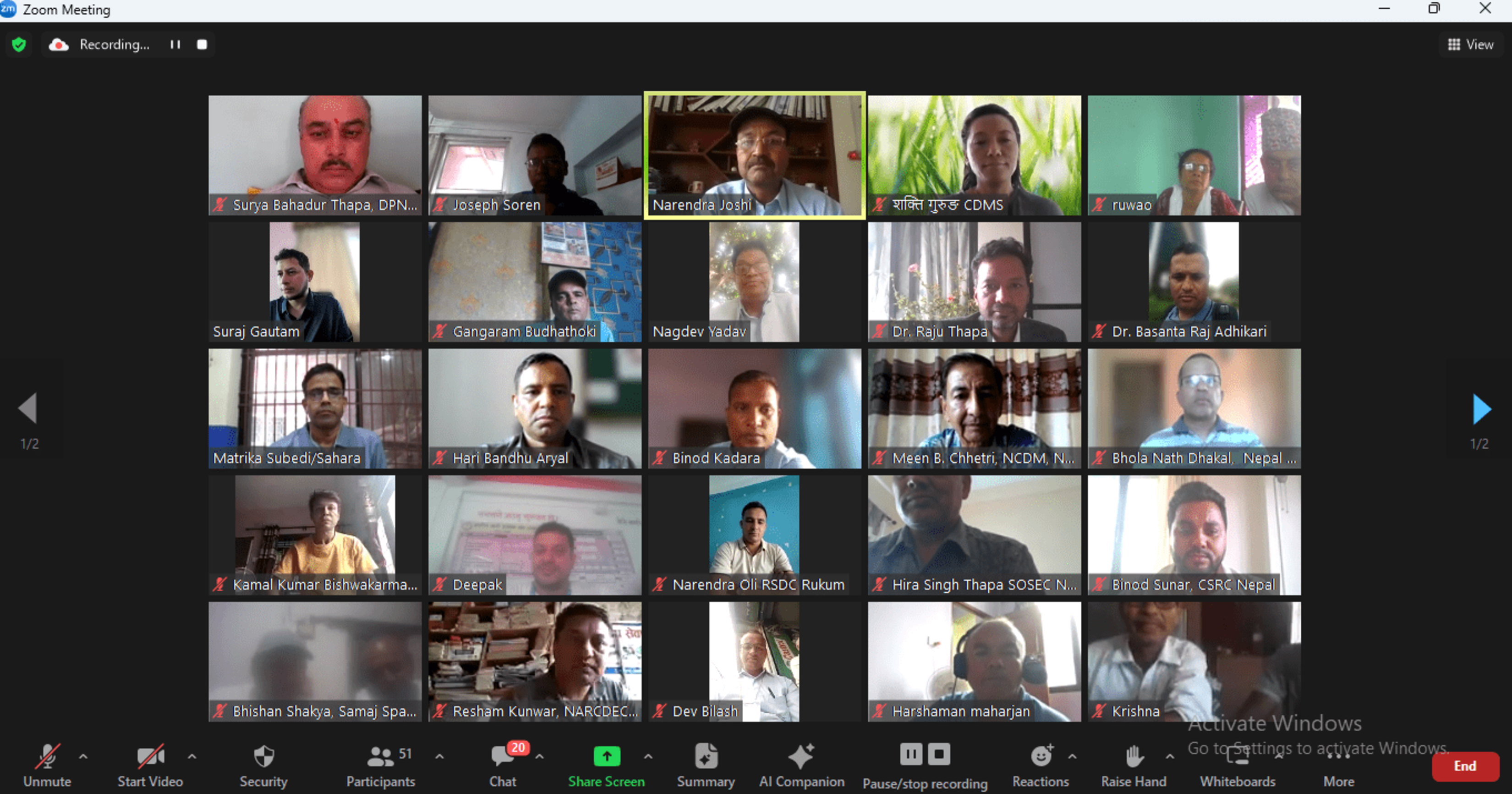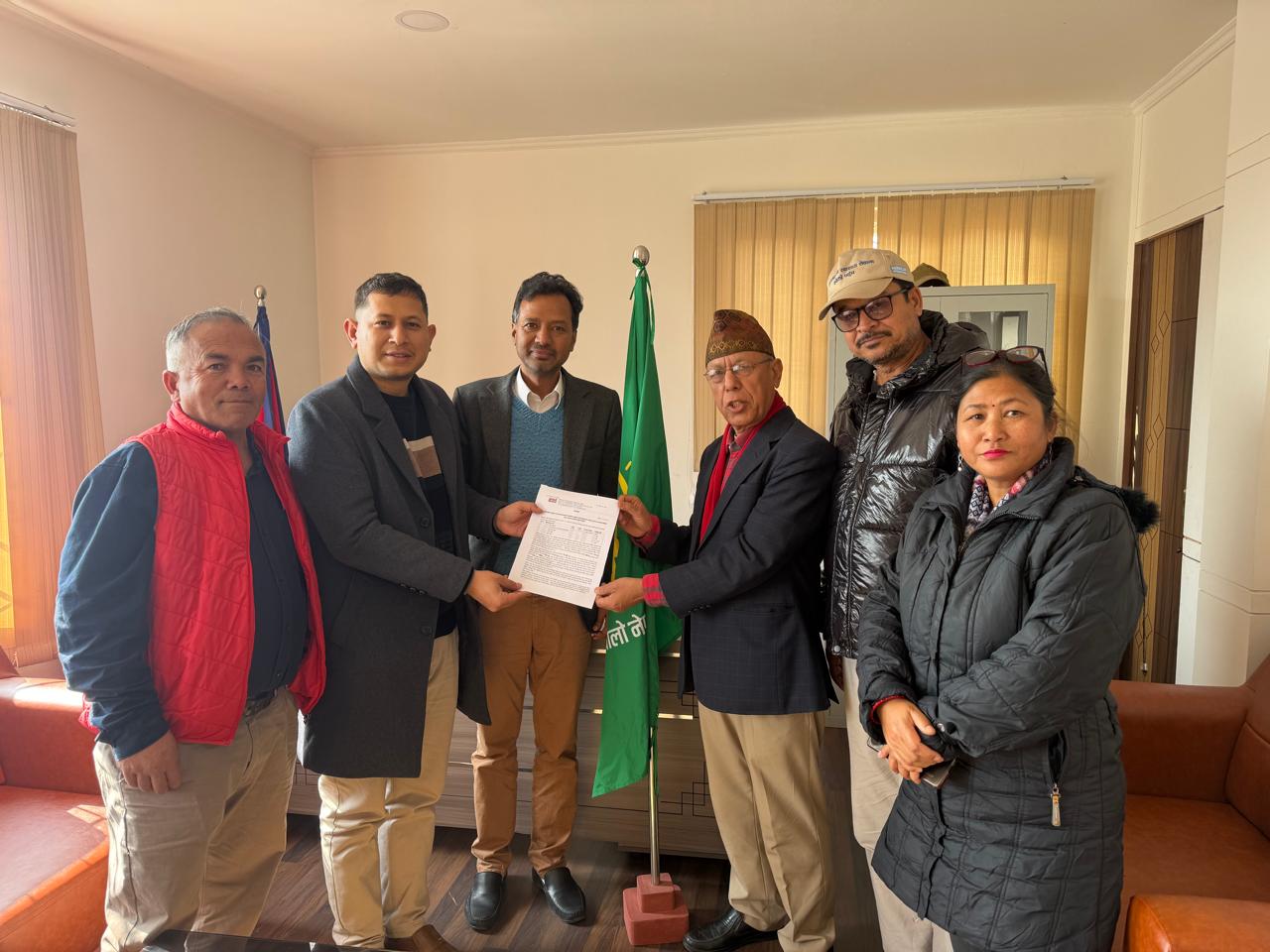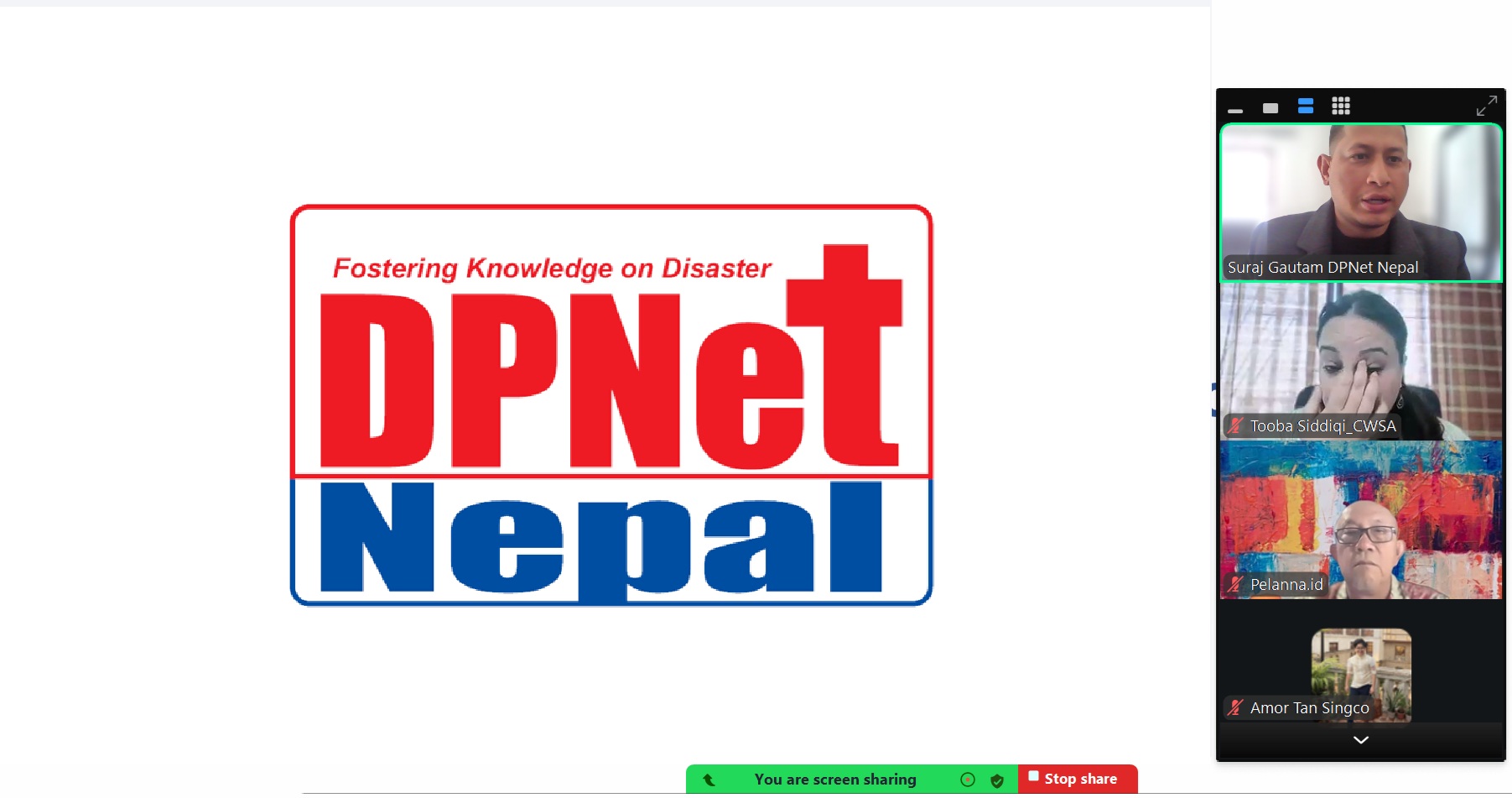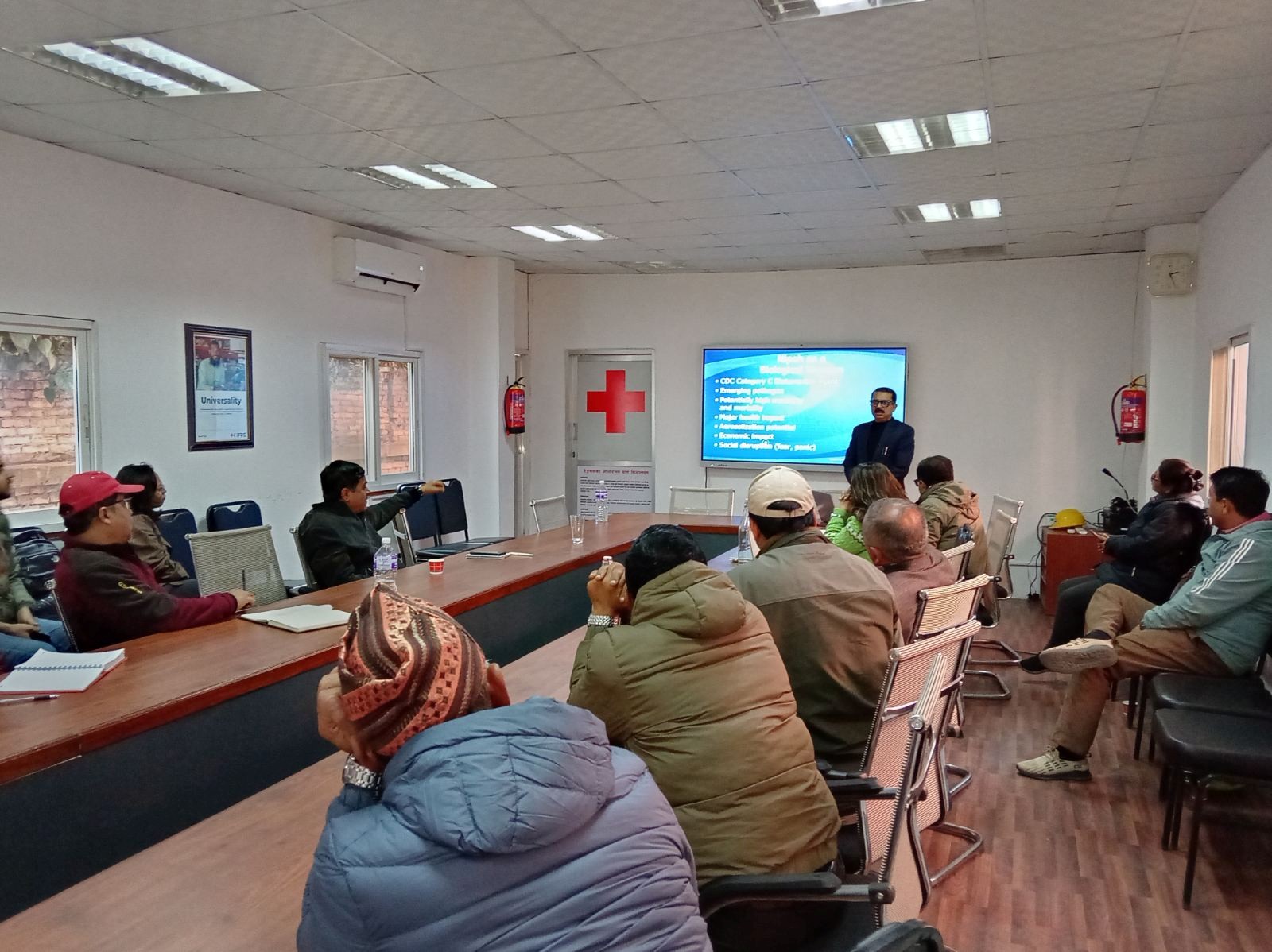Discussion Program on Establishment Day of DPNet Nepal

On June 7, 2024 DPNet Nepal organized the DPNet Nepal's 28th Anniversary program via a virtual Zoom meeting. The program was attended by more than 60 participants. Mr. Suraj Gautam, General Secretary, DPNet Nepal moderated the event and welcomed all participants. The event was chaired by Dr. Raju Thapa, chairperson of DPNet Nepal.
Mr. Surya Bahadur Thapa, IPP DPNet Nepal, shared the opening remarks and provided a brief introduction to DPNet Nepal. Mr. Thapa led the celebration of its 28th anniversary and thanked all participants and expressed his gratitude for this milestone. He shared that DPNet Nepal, established in 1996, initially focused on disaster discussions and later broadened its objectives to include disaster management. He narrated the organization's story, emphasizing its work in capacity building, policy advocacy, coordination and networking, and knowledge management. He highlighted DPNet Nepal's journey, its collaborations with local governments and other organizations, and its commitment to information sharing, policy advocacy, and capacity building. Regarding the criteria for membership, he explained that initially, membership was provided to organizations that included the term "disaster" in their objectives. However, we later amended this provision. Now, institutions that have worked in disaster areas for three years can submit their documentation and become members of DPNet Nepal.
Dr. Raju Thapa, Chairperson, DPNet Nepal, provided a detailed introduction of the organization. From 1996 to 2000, DPNet Nepal was established as a loose forum, initiating policy dialogues on disaster management (DM). From 2001 to 2005, efforts were made to bridge the gap between the government and stakeholders, and advocacy for a DM Act began. Between 2006 and 2010, the organization became a registered legal entity, published the Nepal Disaster Report, and started advocating for strategic planning. From 2011 to 2015, DPNet Nepal developed draft guideline for the Disaster Preparedness and Response Plan and served as the Secretariat of NPDRR, chaired by the Secretary of MoHA. Between 2016 and 2020, it interacted with Members of Parliament (MPs) to formulate the Disaster Management Act and coordinated among ministries, AINTGDM, and stakeholders for the formulation of National Disaster Risk Reduction Policy, 2018 and the National Disaster Risk Reduction Strategic Action Plan, 2018-2030. He addressed that since 2020, the organization has organized a National Conference on Disaster Risk Reduction, conducted Core Humanitarian Standards (CHS) review reflections, and engaged in various policy dialogues at the federal and provincial levels.
Dr. Thapa provided insight into the diverse members of DPNet Nepal including 33 INGOs, 133 NGOs, 3 academic representatives (including the Institute of Crisis Management Studies, Nepal Engineering College (NEC), and the Center for Disaster Studies), and 2 UN agencies. The network also includes 8 life members and 6 individual members, reflecting a broad coalition dedicated to disaster management and advocacy. Dr. Thapa highlighted that DPNet Nepal has facilitated participation in international DRR-related events and serves as the focal point for Sphere Geneva. The organization has localized the Sphere Standards, prepared national human resources cost-effectively on the new version, and disseminated the Sphere Handbook. DPNet efforts include human resource development, sensitization programs at the provincial level, and the production of Sphere drama and folk songs. DPNet has ongoing activities, including creating a web-based 'Online Resource Center' with over 1500 DRR-related documents and a 'Virtual Discussion Platform' to discuss on contemporary issues. He addressed recent significant activities as DPNet has established a committee in all seven provinces of Nepal. The other significant and ongoing recent activities included publishing situation analysis reports on the Bajhang and Jajarkot earthquakes, and providing weekly updates with information on national and international opportunities for grants, awards, conferences, trainings, seminars, and workshops. Dr. Thapa summarized DPNet's plans, which include facilitating Nepal's meaningful participation in APMCDRR 2024 and hosting national conferences on the Chure issue and Disaster Risk Reduction (DRR). DPNet also aims to strengthen the capacity of provincial committees, establish the largest DRR network in each province, and form Provincial Platforms for DRR. Additionally, DPNet plan to create a webpage for each province on the DPNet website and organize at least one provincial conference on DRR.
Lastly, Dr. Thapa emphasized that the monsoon preparedness plan in Koshi, organized by DPNet Nepal, was a success, and a similar initiative is planned for Madesh. In collaboration with UNFAO, DPNet Nepal is actively taking anticipatory action to enhance disaster readiness and response.
Ms. Sita Sharma, Chairperson, Koshi Province committee, mentioned that the Koshi Province committee is the youngest among the provinces. She emphasized the need for insights on how the province can plan and operate its activities. Regarding the updates from Koshi province, Ms. Sharma shared concerns about glacier lake outburst risks and elephant attacks in Jhapa and Morang. She expected to mention these issues on various discussion platforms. She mentioned that comprehensive reports like LDCRP/DPRP have been developed. With the monsoon season approaching, preparations are underway to ensure effective provincial response and readiness.
Mr. Nagdev Yadav, Chairperson, Madhesh Province committee, congratulated all DPNet Nepal members on this occasion. Mr. Yadav emphasized regarding the increased likelihood of heavy monsoon rains this year, discussions focusses around the implementation of a successful monsoon preparedness and response plan in Madesh. This included engagements with the Chief District Officers (CDOs) of Saptari, Siraha, Dhanusa, and Rautahat to ensure alertness and preparedness in last 5-7 days. Emphasis was placed on collaborative efforts with stakeholders and local governments to effectively mitigate risks associated with the monsoon season. Early warning information was disseminated to locals about the monsoon risks. Mr. Yadav also noted the significant loss of biodiversity due to recent forest fires. He emphasized that in close coordination with the District Disaster Management Committee (DDMC), the Local Disaster Management Committee (LDMC) has been actively working on disaster risk management in Madesh Province, highlighting the collaborative efforts with DPNet Nepal.
Mr. Hira Singh Thapa, Chairperson, Karnali Province committee, reported that the devastating earthquake in Jajarkot had impacted Karnali Province and DPNet Karnali Province working on recovery and reconstruction initiatives.
Mr. Hari Bandhu Aryal, Chairperson of the Gandaki Province Committee, shared that today they celebrated DPNet Day in Gandaki Province, focusing on the theme of aligning disaster management with climate change. He mentioned that as the monsoon preparedness plan is being developed in Gandaki, they are actively working to provide insights and inputs for its formulation.
Kamal Kumar Bishwakarma, Chairperson, Bagmati Province committee, discussed various issues faced by Bagmati Province, including drought, epidemics, road accidents, urban flooding, and animal attacks in some areas. He noted that laws and policies related to disaster risk management were not fully enforced. Despite this, Bagmati Province had carried out more disaster management activities compared to other provinces. Mr. Bishwakarma emphasized the need for more organizations to join DPNet Nepal to work together and called for the development and implementation of additional policies. He also urged for feedback and suggestions from member organizations about the future work to be done by DPNet Nepal.
Open Floor Discussion:
Ms. Sita Sharma inquired about the process of preparing and utilizing letter pads effectively. She also inquired for how could we plan strategies and organize future programs.
Mr. Meen Bahadur Chhetri, former Chairperson DPNet and NCDM Nepal, emphasized the distinction between DPNet and other NGOs, noting that DPNet is a controversy-free and non-profit organization. He praised the young and energetic board, highlighting their creativity. Chhetri stressed the importance of establishing strict criteria and clarifying objectives for new members to ensure transparency. He suggested that new members should be informed about what DPNet can offer them before being granted membership, preferably through Zoom meetings or in-person discussions. Chhetri also highlighted DPNet's major achievements, including international training seminars conducted in 2007 and 2010 in collaboration with Turkey, Sweden, and Queensland University of Australia. Additionally, he expressed gratitude to the Red Cross Nepal for providing office space to DPNet. He recommended modeling DPNet as a model NGO.
Mr. Bishnu Chalise, RUWAO Nepal, Sarlahi, expressed gratitude to the chairperson for organizing the online Zoom program. He highlighted two major disasters in Madhesh: flooding during the monsoon season and droughts and fires during the dry season. Mr. Chalise urged DPNet Nepal to increase its participation in such issues. He mentioned that the government provided only 15,000 rupees for individuals affected by fires, which he believed to be insufficient.
Mr. Deo Narayan Yadav suggested that the membership renewal fee should be based on a 3-year or 5-year cycle rather than an annual basis. He expressed gratitude to DPNet as a guiding force and path provider, emphasizing its role as an advocacy-supporting organization. Addressing resource gaps, he proposed planning resources for 3-5 years and actively seeking additional resources.
Mr. Saroj Bhujel, HUSADEC Nepal expressed appreciation to DPNet for providing insights on disaster management, which serves as valuable learning for them. He highlighted the issue of animal attacks on agricultural fields and urged for the organization of discussion events to address this concern. Additionally, he mentioned climate change issues, noting a decline in rainfall in the eastern mountain region due to climate change.
Dr. Raju Thapa , Chairperson sharing his insights regarding queries:
In a recent development, DPNet Nepal has announced a series of measures aimed at streamlining its operations and enhancing disaster management efforts across provincial committees. Plans include organizing orientation meetings to familiarize provincial committees with the use of letterheads, ensuring strict adherence to DPNet membership criteria, and clarifying that DPNet does not engage in competition with member organizations for project bids. Additionally, a provision has been made to allow member organizations to pay their annual fees during the Annual General Meeting (AGM) offering added convenience. In response to pressing issues such as animal attacks and Chure conservation, DPNet plans to conduct discussion events and leverage its previous experience in addressing similar challenges. Moreover, the organization has been advocating among stakeholders to work on earthquake induced landslide affected areas of Jajarkot and West Rukum. He thanked everyone and closed the program.
Ms. Shakti Gurung, Vice Chairperson, DPNet Nepal, shared her vote of thanks with all member organizations. Ms. Gurung expressed her hope that DPNet will celebrate its silver, golden, and diamond jubilees in the future. She emphasized that we are all part of a single family working together to achieve a common goal and that we will continue to work with the same spirit in the coming years.











